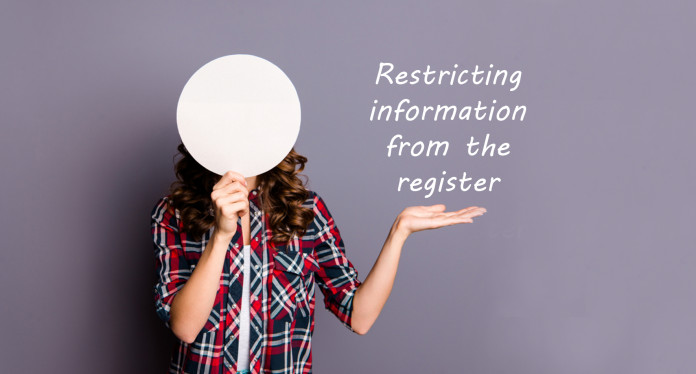Restricting information from the Register

Published 29 October 2019
[![]() 3 minutes to read]
3 minutes to read]
One of the main purposes of the Charities Register is to provide the public with access to information on all registered charities. The basic idea is that a charity gets certain benefits for being registered and, in return, the charity provides the public information about its activities and finances. We know that transparency around the use of charitable funds is one of the key drivers of public trust and confidence in charities.
Some information is not available to the public on the Charities Register however because the Charities Act 2005 allows us to withhold information from the public on the Charities Register when it is in the public interest to do so. For example, many women’s refuges apply to withhold their address, and sometimes the officer’s details, from public view to ensure the safety of their shelters and the people who use them. When an individual or group’s safety is at risk we will always withhold information.
We also automatically withhold some information, such as IRD numbers and the dates of birth of officers, for obvious reasons.
We receive a lot of requests to withhold information, but we decline most of them. We thought it would be worth discussing the three main reasons why we decline requests, and explaining why we do.
Reason: Blank or unrelated
A lot of people click the “restricting information” box when they are doing their annual return without a reason, or just by typing some random words into the box, or by using the opportunity to communicate something unrelated to us, such as, “This is just a draft performance report”. Requests without reasons provided won’t be approved.
If you do need to communicate something as part of your annual return, please call 0508 242 748 or email info@charities.govt.nz.
Reason: Privacy
There is some information that can be withheld for reasons of privacy.
For example, if your performance report or financial statements include specific salary details about named individuals, we consider that that is enough for information to be withheld. We believe the privacy of an individual’s salary details overrides any public interest in knowing these details. Although we don’t think this reason extends to the amount of money the charity spends on all employment-related costs.
Some argue that because they don’t seek donations from the public, then the charity’s information is private. This isn’t a good enough reason to withhold information about your charity from the public. There are many benefits that all charities receive from registration, not only those that get donations from the public.
Reason: Commercial reasons
A lot of charities are in competition with other businesses. For example, a charitable health clinic might be competing for contracts with a for-profit health centre across the road.
Some charities argue that this is a good reason for withholding information but, on its own, it is not enough to have information withheld. Charitable businesses receive the same benefits from registration as other charities (including certain tax benefits) which their non-charitable competitors don’t.
In some cases, if there is a specific deal or contract that you are negotiating, some information may be restricted from the annual return for a period of time, but commercial reasons for restricting information are usually declined.
The importance of transparency
Two of the most important things about being a charity are publicly reporting on your activities and being available to be contacted by the public. These were some of the reasons why the Charities Act was passed. If you want to withhold information, it has to be in the interest of the public to do so, not just the interest of you or your group.
That being said, every decision is made on a case-by-case basis; if you have a specific reason that you think does merit withholding information, you can submit it during registration, when filing your annual return or updating your details on the Register.
You can read more about restricting information from public view and what you can do if you disagree with our decisions on our website(external link).



